新目标九年级英语Unit12课件
- 格式:ppt
- 大小:8.48 MB
- 文档页数:89
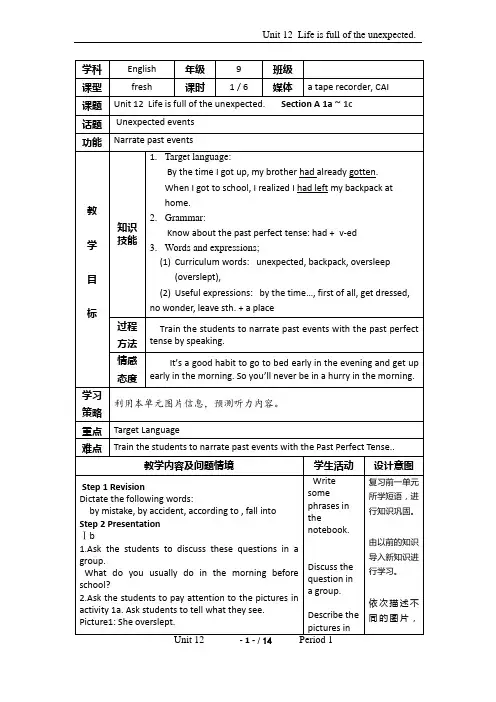
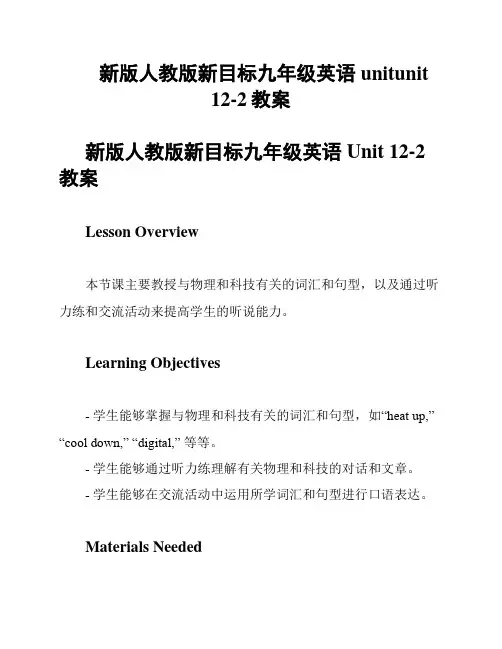
新版人教版新目标九年级英语unitunit12-2教案新版人教版新目标九年级英语Unit 12-2教案Lesson Overview本节课主要教授与物理和科技有关的词汇和句型,以及通过听力练和交流活动来提高学生的听说能力。
Learning Objectives- 学生能够掌握与物理和科技有关的词汇和句型,如“heat up,” “cool down,” “digital,” 等等。
- 学生能够通过听力练理解有关物理和科技的对话和文章。
- 学生能够在交流活动中运用所学词汇和句型进行口语表达。
Materials Needed- 教材:新目标九年级英语教材第十二册(2)单元- 板书、PPT等教学辅助工具Lesson Plan1. 导入(5分钟)- 通过展示有关物理和科技的图片或展示实物引起学生的兴趣。
2. 听力练(15分钟)- 播放录音,让学生听力理解有关物理和科技的对话和文章。
- 听力练材料可从教材中选取。
3. 词汇和句型研究(20分钟)- 教授与物理和科技有关的词汇和句型,如“heat up,” “cool down,” “digital,” 等等。
- 通过示范和练,让学生掌握这些词汇和句型的用法。
4. 交流活动(20分钟)- 将学生分成小组,让他们运用所学词汇和句型进行交流活动,如讨论自己使用的科技产品,描述物理实验等。
5. 小结(5分钟)- 回顾本节课所学的重点内容,强调学生的研究成果。
6. 作业布置(5分钟)- 布置相关的阅读或写作作业,巩固学生对物理和科技词汇的掌握。
Assessment- 教师可通过观察学生在课堂交流活动中的表现来评估他们对词汇和句型的掌握情况。
- 可以布置写作作业来进一步评估学生对物理和科技词汇的应用能力。
Extension- 学生可通过查找更多与物理和科技有关的资料来扩展自己的知识。
- 可以进行科技相关的实验或小项目,让学生亲身体验物理和科技的应用。
Additional Resources- 在老师用课堂教学中,可以准备一些物理和科技相关的视频或在线资源,增加学生对相关话题的兴趣和理解。
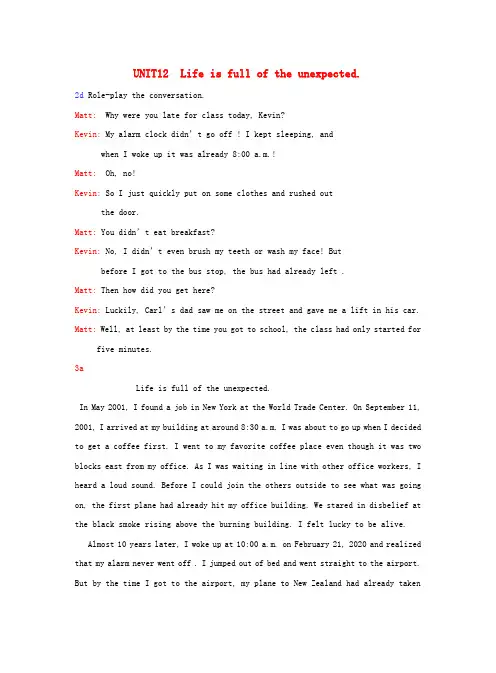
UNIT12 Life is full of the unexpected.2d Role-play the conversation.Matt: Why were you late for class today, Kevin?Kevin: My alarm clock didn’t go off ! I kept sleeping, andwhen I woke up it was already 8:00 a.m.!Matt: Oh, no!Kevin: So I just quickly put on some clothes and rushed outthe door.Matt: You didn’t eat breakfast?Kevin:No, I didn’t even brush my teeth or wash my face! Butbefore I got to the bus stop, the bus had already left .Matt: Then how did you get here?Kevin:Luckily, Carl’s d ad saw me on the street and gave me a lift in his car. Matt: Well, at least by the time you got to school, the class had only started for five minutes.3aLife is full of the unexpected.In May 2001, I found a job in New York at the World Trade Center. On September 11, 2001, I arrived at my building at around 8:30 a.m. I was about to go up when I decided to get a coffee first. I went to my favorite coffee place even though it was two blocks east from my office. As I was waiting in line with other office workers, I heard a loud sound. Before I could join the others outside to see what was going on, the first plane had already hit my office building. We stared in disbelief at the black smoke rising above the burning building. I felt lucky to be alive.Almost 10 years later, I woke up at 10:00 a.m. on February 21, 2020 and realized that my alarm never went off . I jumped out of bed and went straight to the airport. But by the time I got to the airport, my plane to New Zealand had already takenoff . “This is the first holiday I’ve taken in a year, and I miss my plane. What bad luck!” I thought to myself. The other planes were full so I had to wait till the next day. The next morning, I heard about the earthquake in New Zealand the day before. My bad luck ad unexpectedly turned into a good thing.Section BApril Fool’s Day is a celebration that takes place in different countries around the world. It happens on April 1st every year and is a day when many people play all kinds of tricks and jokes on each other.One April Fool’s Day, a reporter in England announced that there would be no more spaghetti because the spaghetti farmers in Italy had stopped growing spaghetti. Many people ran to their local supermarkets to buy as much spaghetti as they could. By the time people realized that the story was a hoax, all of the spaghetti across the country had been sold out. Another famous trick in England was when a TV show reported the discovery of special water. They said this water would help people lose weight and that one customer had already lost a lot of weight in just four months. By the end of the day, more than 10,000 people had phoned the TV station to find out how to get this water.Many April Fool’s jokes may end up being not very funny. A famous TV star once invit ed his girlfriend onto his show on April Fool’s Day. He asked her to marry him. The lady was so happy because she really wanted to get married. However, when she said “yes”, he replied, “April Fool!” That little joke didn’t have a very happy ending. The TV star lost both his girlfriend and his show.One of the world’s most famous tricks, however, happened in October rather than April. In that month in 1938, actor Orson Welles announced on his radio program that aliens from Mars had landed on the earth. He described where they had landed and told how they were moving across the United States. Wellesmade it sound so real that hundreds of people believed the story, and fear spread across the whole country. By the time police officers announced that the story was a hoax, thousands of people had left their homes.。
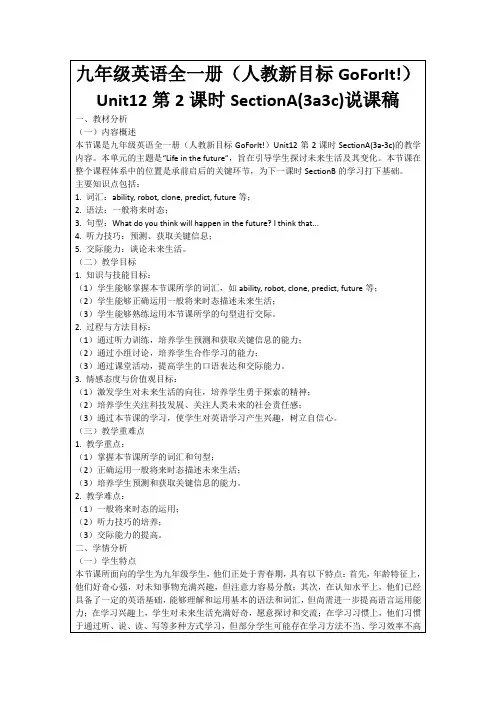
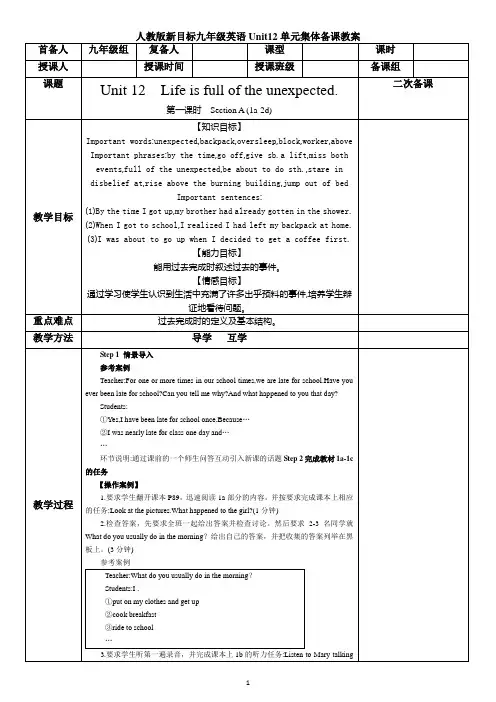
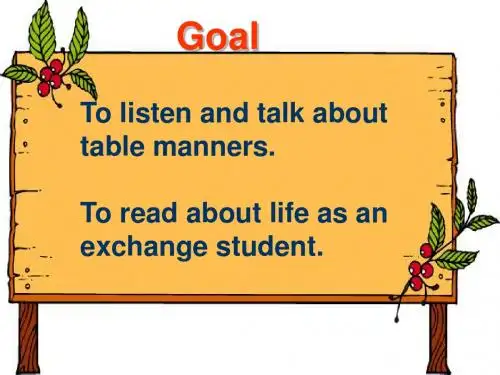

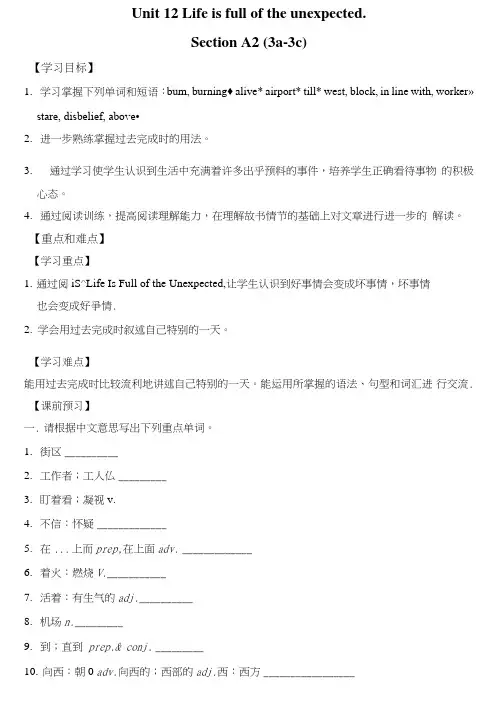
Unit 12 Life is full of the unexpected.Section A2 (3a-3c)【学习目标】1.学习掌握下列单词和短语:bum, burning♦ alive* airport* till* west, block, in line with, worker»stare, disbelief, above•2.进一步熟练掌握过去完成时的用法。
3.通过学习使学生认识到生活中充满着许多出乎预料的事件,培养学生正确看待事物的积极心态。
4.通过阅读训练,提高阅读理解能力,在理解故书情节的基础上对文章进行进一步的解读。
【重点和难点】【学习重点】1.通过阅iS^Life Is Full of the Unexpected,让学生认识到好事情会变成坏事情,坏事情也会变成好爭情.2.学会用过去完成时叙述自己特别的一天。
【学习难点】能用过去完成时比较流利地讲述自己特别的一天。
能运用所掌握的语法、句型和词汇进行交流. 【课前预习】一.请根据中文意思写岀下列重点单词。
1.街区__________2.工作者;工人仏_________3.盯着看;凝视v. _________4.不信:怀疑_____________5.在... 上而prep,在上面adv. _____________6.着火:燃烧V. ___________7.活着:有生气的adj. __________8.机场n. _________9.到;直到prep.& conj. _________10.向西:朝0 adv.向西的;西部的adj.西:西方_________________二.请认真阅读课文,找出下列重点短语。
11.错过两个事件 _____________12.充满着不可预知性 _____________13.正要做某事 _____________14.与……成一排 _____________15.难以置信地盯着 _____________16.从正在燃烧的楼上升起 _____________17.跳下床 ____________三、请用以上重点短语完成下列句子。
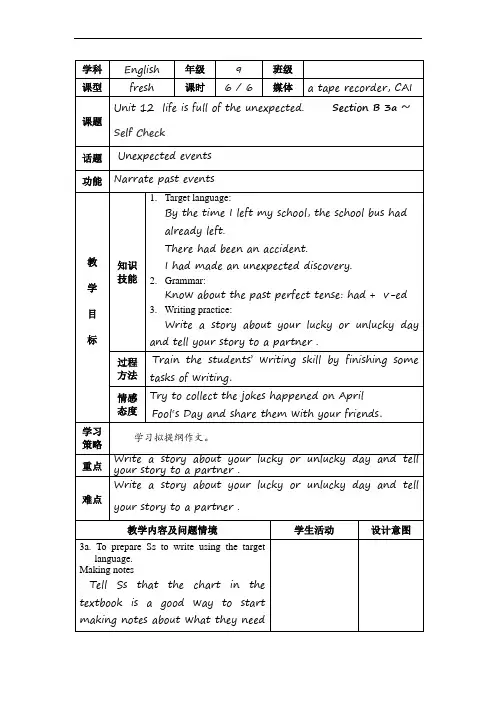
学科English 年级9 班级课型fresh 课时 6 / 6 媒体 a tape recorder, CAI课题Unit 12 life is full of the unexpected. Section B 3a ~ Self Check话题Unexpected events 功能Narrate past events教学目标知识技能1.Target language:By the time I left my school, the school bus hadalready left.There had been an accident.I had made an unexpected discovery.2.Grammar:Know about the past perfect tense: had + v-ed3.Writing practice:Write a story about your lucky or unlucky dayand tell your story to a partner .过程方法T rain the students’ writing skill by finishing sometasks of writing.情感态度Try to collect the jokes happened on AprilFool‘s Day and share them with your friends.学习策略学习拟提纲作文。
重点Write a story about your lucky or unlucky day and tell your story to a partner .难点Write a story about your lucky or unlucky day and tell your story to a partner .教学内容及问题情境学生活动设计意图3a. To prepare Ss to write using the target language.Making notesTell Ss that the chart in the textbook is a good way to start making notes about what they needto write about. It is always a good idea to think about the subject matter and make notes.Tell Ss that even if they don’t have a chart to guide them, they should make it a habit to make quick notes.3b. To provide Ss with writing practice using the target language.One lucky, one unluckyTo avoid having to many stories of one type, ask Ss which they will be writing about before they actually start writing. If there really many of one type (lucky or unlucky), ask Ss in this group if any of them have a different story to tell, encourage them to make the switch.Next, pair up Ss.Sample writing:My lucky dayI will always remember that the date February 24, 2014.this was the luckiest day of my life.When I woke up that morning, the sky was very dark. I took the early bus to school as usual. As soon as I arrived at school, it started to rain very heavily. Many students were late and all wet when they got to school. But I wasn’t because I caught the early bus, I would have Practice writing. Share the story with your partner.been late and wet as well!Later that day, I realized that I had forgotten my wallet andcouldn’t buy lunch. I couldn’t believe it. Then my friend Lisa said that she could share her lunch with me.Finally, my older brother told me that night that he could take me to the concert that I’d been dying to attend that weekend. I was so happy!I think that was the best day I’d had in a long time.What a lucky day!Self checkTo provide a comprehensive review of key vocabulary and functions presented in the unit. Pare up and come up with five possible answers.板书设计Unit 12 life is full of the unexpected.Section B 3a ~ Self CheckBy the time I left my school, the school bus had already left.There had been an accident.I had made an unexpected discovery.Sample writing:(See it above.)反思。
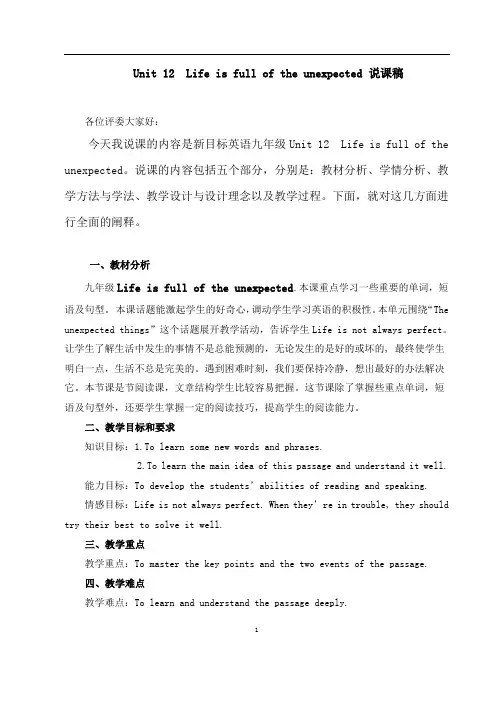
Unit 12 Life is full of the unexpected 说课稿各位评委大家好:今天我说课的内容是新目标英语九年级Unit 12 Life is full of the unexpected。
说课的内容包括五个部分,分别是:教材分析、学情分析、教学方法与学法、教学设计与设计理念以及教学过程。
下面,就对这几方面进行全面的阐释。
一、教材分析九年级Life is full of the unexpected.本课重点学习一些重要的单词,短语及句型。
本课话题能激起学生的好奇心,调动学生学习英语的积极性。
本单元围绕“The unexpected things”这个话题展开教学活动,告诉学生Life is not always perfect。
让学生了解生活中发生的事情不是总能预测的,无论发生的是好的或坏的, 最终使学生明白一点,生活不总是完美的。
遇到困难时刻,我们要保持冷静,想出最好的办法解决它。
本节课是节阅读课,文章结构学生比较容易把握。
这节课除了掌握些重点单词,短语及句型外,还要学生掌握一定的阅读技巧,提高学生的阅读能力。
二、教学目标和要求知识目标:1.To learn some new words and phrases.2.To learn the main idea of this passage and understand it well.能力目标:To develop the students’abilities of reading and speaking.情感目标:Life is not always perfect. When they’re in trouble, they should try their best to solve it well.三、教学重点教学重点:To master the key points and the two events of the passage.四、教学难点教学难点:To learn and understand the passage deeply.1五、教法与学法本课主要是一节阅读课,根据《英语课程标准》及《英语教学大纲》的要求,在本节课的教学过程中,采用“小组合作“以及“任务型”的教学途径,同时我还结合了情景教学法。
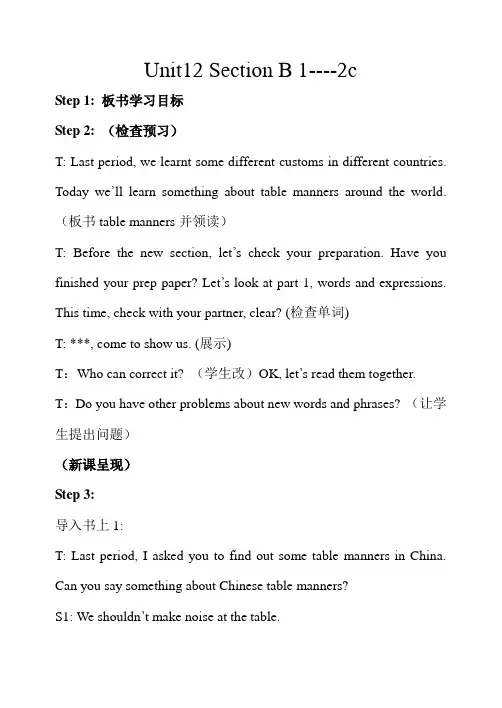
Unit12 Section B 1----2cStep 1: 板书学习目标Step 2: (检查预习)T: Last period, we learnt some different customs in different countries. Today we’ll learn something about table manners around the world. (板书table manners并领读)T: Before the new section, let’s check your preparation. Have you finished your prep paper? Let’s look at part 1, words and expressions. This time, check with your partner, clear? (检查单词)T: ***, come to show us. (展示)T:Who can correct it? (学生改)OK, let’s read them together.T:Do you have other problems about new words and phrases? (让学生提出问题)(新课呈现)Step 3:导入书上1:T: Last period, I asked you to find out some table manners in China. Can you say something about Chinese table manners?S1: We shouldn’t make noise at the table.S2: We aren’t supposed to knock the bowls with chopsticks.S3: We are supposed to pick up the bowl to eat.T: Wonderful! You must behave well when you have meals. It’s very important to know about table manners in different countries. Let’s open books and look at part 1, now talk about these table manners with your groups and guess which is true and which is false. (让学生先讨论----单独提问---学生读,说答案,改正)Step 4 (引出重点句型It’s rude to …)T: In the United States, we’re not supposed to eat with hands. Why? S: It’s rude.T: Yes, who can connect them into one complete sentence?S: It’s rude to eat with hands in the United States. (老师板书重点句型It’s rude to …)Step 5 (出示PPT,让学生用It’s rude to …看图造句)T: Look at the screen; here are some table manners in China. Now let’s talk about these pictures with “It’s rude/ polite to …”. You can say with your partners. (小组先造句)S1:S2:S3:S4:S5:Now this time, work in pairs to talk about them with “We are supposed to do …” and “Yes. It’s rude to …”(两人一组编对话)Step 6 (导入学生表演)T: As we know, there are many rude behaviors when we have meals. We must stop it! Who can give us a performance about table manners around us? Welcome!If you find something rude, you can say stop and tell us.(结束学生表演)Good job. Thank you for acting! We must mind our manners. Please remember, when in Rome, do as the Romans do.Step 7 (听力)2a(导入)T: Do you want to be an exchange student to go to another country? Steve is a lucky boy and he has a chance to go to Japan to become an exchange student. His friend Sataoshi is telling him something about Japanese table manners.T: Here are some pictures about Japanese table manners. What are theydoing? (学生看图说短语)S1:S2:S3:S4:T: OK, let’s listen and number the pictures when you hear them. You must catch these key phrases with your ears carefully. Who can come to the front? (让1名学生到白板上写----检查)2bT: This time listen again, match these sentence part. Who can come to the front? (让1名学生到白板上写--检查)Step 8 (日本礼仪填空)T: OK, let’s take out your paper and check your memory. Fill in the blanks.(让学生到白板上写—检查)Step 9: 导入学生展示T: Do you collect table manners in others countries? OK, you can show us now. You can discuss with your group. (学生先讨论1分钟,之后展示)Step 10: 总结T: OK. So much for today. Who can tell us what we learnt?S: words and phrasesS: It’s rude to …S: table mannersT: Great! Don’t forget to mind your manners and do as the Romans do! Here are some exercise for you! (反馈并改正,用实物投影)Step 11:作业Write a passage about table manners you find and make some posters about table manners with your group. Thank you for listening!板书设计:Unit 12 You are supposed to shake hands.The third period1.table manners, make a noise, stick into2.It’s rude to …。
美知【重点词组或短语】【重难点句子】1.go off 响铃2.give sb.a lift 捎某人一程3.be about to do sth.正要做某事4.stare in disbelief at 难以置信地盯着5.raise above the burning building 从正在燃烧的楼上升起6.jump out of bed 跳下床7.collect the math homework 收数学作业plete the work for my boss 完成老板的工作9.show up 赶到,出现10.get stressed out 紧张起来11.hand in homework 交作业12.take place 发生13.play all kinds of tricks and jokes 开各种玩笑14.sell out 卖完,售完15.lose weight 减肥16.by the end of that day 到那天结束时17.end up with 以……结束18.get married 结婚19.have a happy ending 有一个幸福的结局20.fear spread across the whole country 恐惧席卷整个国家21.head west 向西前进22.in the middle of the road 在路中间23.turn around 调头、转身24.make an unexpected discovery 有一个出人乎意料的发现25.cancel the plan 取消计划26.lead to 通向27.miss doing sth.错过做某事28.show up 赶到;露面1.I was about to go up when I decided to get a coffee first.我正准备上去,这时决定先喝一杯咖啡。
2.As I was waiting in line with other office workers,I heard a loud sound.正当我和其他办公室员工在排队等候时,我听到了一声巨响。
Unit12 教材解读1.0T extbook Analysis教材解读1.1本单元以“难以预料的事情(Unexpected Events)”为话题,谈论过去发生的事件。
Section A在内容上侧重讲述发生过的意想不到的事情,涉及了解到过去完成时描述过去某一时间或动作之前已经发生或完成了的动作,以及运用一般过去时态描述过去某个时间里发生的动作或存在的状态。
在语法方面,要求学生掌握“had + 过去分词形式”的结构来表示过去完成时态,构建对于由by the time + 从句作为时间状语后的过去完成时态的语言表达。
在情感态度方面,教师借助本部分内容的学习,帮助学生能够用适当的时态叙述过去发生的事情,特别是意想不到的事情。
Section B在话题上,从学生的生活琐事、意外事故过渡到生活当中的出其不意的玩笑,特别是愚人节发生的让人难以预料的事情。
在语言上,进一步丰富与学习相关的话题词汇。
在技能上,将听说能力综合,突出阅读训练,由读促写。
在教学策略上,要引导学生关注过去完成时态的结构,并且能判断和正确使用过去完成时态描述过去发生的事情。
在情感上,多鼓励学生敢于和坦然面对描述和表达自己的或有趣或窘迫或有意义的人生经历,同时引导和告诉学生在遇到地震或者火灾的时候如何进行自救和逃生。
1.2S ection A 1a 活动1a是Lead-in部分。
旨在通过Free talk导入新的语言现象,谈论出其不意的事情。
教师可以鼓励学生积极思考提出更多的同类型短语。
这样可以有效为1c的口语小对话做好铺垫。
1.3S ection A 1b-1c 活动1b-1c是Listening and speaking部分。
引导学生观察1b 的三个句子,找出未学过的过去完成时语法结构“had + 过去分词形式”,然后两人一组讨论什么时候要用过去完成时态和相关的句型结构。
教师可以抽问学生过去完成时态的名称和基本结构,帮助学生建立对过去完成时态的初步的印象。
Unit 12 Life is full of the unexpected.知识点讲解一、Life is full of the unexpected. 生活充满了出乎意料的事。
unexpected adj.出乎意料的;始料不及的the unexpected"意外的事情;出乎意料的事"。
英语中,有些形容词与定冠词the连用,表示一类人或事物,在句子中起集体名词的作用。
the homeless 无家可归者the disabled 残疾人the poor 穷人the rich 富人例句:The old should be taken good care of by the government.政府应该好好照顾老年人。
二、By the time I got up, my brother had already gotten in the shower. 当我起床时,我哥哥已经进了浴室了。
by the time表示"到……时为止,在……以前",常引导表示过去的时间状语从句,主句常用过去完成时,即had+动词过去分词。
例句:By the time I got there, he had already left.在我到那儿之前,他已经离开了。
三、I was about to go up when I decided to get a coffee first. 我正要上楼,这时我决定先去买杯咖啡。
be about to... when...意为"正打算做……突然……",可表示将来的情况,但它表达的是最近的将来。
1、【辨析】be about to do与be going to do① be about to do表示马上就要发生的事,可与when引导的时间状语从句连用。
例句:We are about to start. 我们就要出发了。
【注意】be about to do不可和tomorrow等表示将来的副词连用。
Unit 12 Life is full of the unexpected.Section A 1a-2d 教学设计内容分析本课是人教版九年级第12单元的教学内容。
本单元主要学习如何讲述过去发生的事情。
能够理解过去完成时(past perfect tense),能正确使用有when, before, as, by the time引导的时间状语从句表示过去发生的事情。
话题是unexpected events,贴近学生生活实际,能引起学生的学习欲望。
Section A部分的中心话题是讲述发生过的意想不到的事情。
教学重点是让学生明白过去时态和过去完成时态的区别,并能运用这两种时态叙述过去发生的事情。
本课是一节听说课。
学习内容围绕女孩Mary因为晚起导致上学迟到等一系列后果。
本课是本单元的第一课时,在整个单元中起着话题导入的作用。
内容贴近学生的生活实际,所含功能句都是日常生活用语,因此课堂任务应侧重培养叙述的语言实践能力。
1a-1c用五福主题图片呈现了女孩Mary遭遇到的一系列意想不到的事件场景:睡过头、浴室被占用、跑步出门、错过校车和把书包落在家。
活动围绕这五幅图片,以看图说话、听力及对话展开是整个Section A 部分的基础。
这部分还引入了新的语法结构:过去完成时。
学情分析本节课的中心话题是围绕女孩Mary因为晚起导致一系列意想不到的事件。
在讲述过程中,when, before, as, by the time引导的时间状语从句用一般过去时态,这个时态由于是复习,学生易于掌握。
同时导入过去完成时,让学生了解过去完成时态描述过去某一时间或动作之前已经发生或完成的动作。
这是重点也是难点。
由于话题贴近学生生活实际,在学习的过程中,结合女孩Mary 的bad day的情景讲述,很容易激发学生的同感并引起其学习兴趣。
【教学目标】:1. 语言知识目标:(1)学生能掌握以下单词及短语:unexpected, by the time, backpack, oversleep, ring, give …a lift,(2)学生能够掌握过去完成时的结构和用法。
首备人授课人课题教学目标重点难点教学方法教学过程人教版新目标九年级英语Unit12 单元集体备课教案九年级组复备人课型授课时间授课班级Unit 12 Life is full of the unexpected.第一课时Section A (1a-2d)【知识目标】Important words:unexpected,backpack,oversleep,block,worker,aboveImportant phrases:by the time,go off,give sb.a lift,miss bothevents,full of the unexpected,be about to do sth.,stare indisbelief at,rise above the burning building,jump out of bedImportant sentences:(1)B y the time I got up,my brother had already gotten in the shower.(2)W hen I got to school,I realized I had left my backpack at home.(3)I was about to go up when I decided to get a coffee first.【能力目标】能用过去完成时叙述过去的事件。
【情感目标】通过学习使学生认识到生活中充满了许多出乎预料的事件,培养学生辩证地看待问题。
过去完成时的定义及基本结构。
导学互学Step 1 情景导入参考案例Teacher:For one or more times in our school times,we are late for school.Have youever been late for school?Can you tell me why?And what happened to you that day?Students:①Yes,I have been late for school once.Because…②I was nearly late for class one day and……环节说明:通过课前的一个师生问答互动引入新课的话题Step 2 完成教材1a-1c的任务【操作案例】1.要求学生翻开课本P89,迅速阅读1a 部分的内容。
新目标九年级英语Unit 12 词汇详解1. shakev.摇动, 摇, 颤抖, 震动n.摇动, 摇, 颤抖, 震动(shook [Fuk]; shaken [5FeikEn])a fair shake[美]正常交易, 公正的处置[待遇]a shake of one's [the] head摇头(表示拒绝、否认、怀疑、失望)a shake of the hand握手all of a shake浑身发抖be shaken at被...惊吓]give (sb., sth.) the shake[美俚]摆脱(某人、某事); 避开(某人、某事)great shakes非常出色[重要]; 特别能干have the shakes发疟疾in a brace [couple] of shakes (=in the shake of a lamb's tail, in two shakes, in half a shake)片刻[立刻, 倾刻]之间, 一会儿no great shakes[俚]并不特别重要; 没有什么了不起; 平常得很on the shake[美俚]参与犯罪活动put sb. on the shake (=put the shake on sb.)[美俚]向某人勒索钱财shake down摇落(果实)(把毯子等)做成临时床铺(指人)和睦相处; 适应下来; (指物)安装稳妥, 运转正常整理使有秩序精简[美俚]敲诈[俚]搜查, 搜索shake in one's shoes吓得发抖shake it up[美俚]赶快, 赶紧shake off抖[弹, 拍]去摆脱; 撵走shake oneself free [loose] from摆脱shake oneself together奋发; 拿出勇气; 聚精会神, 全力以赴shake out展开(旗, 帆等), 散开; 抖掉, 拂去, 摆脱shake up摇匀[动, 醒]打击使感到震动, 震惊, 慌乱2. custom n.习惯, 风俗, <动词单用>海关, (封建制度下)定期服劳役, 缴纳租税, 自定义, <偶用作>关税v.定制, 承接定做活的have sb.'s custom受某人照顾Once is no custom.[谚]一次不能成例。